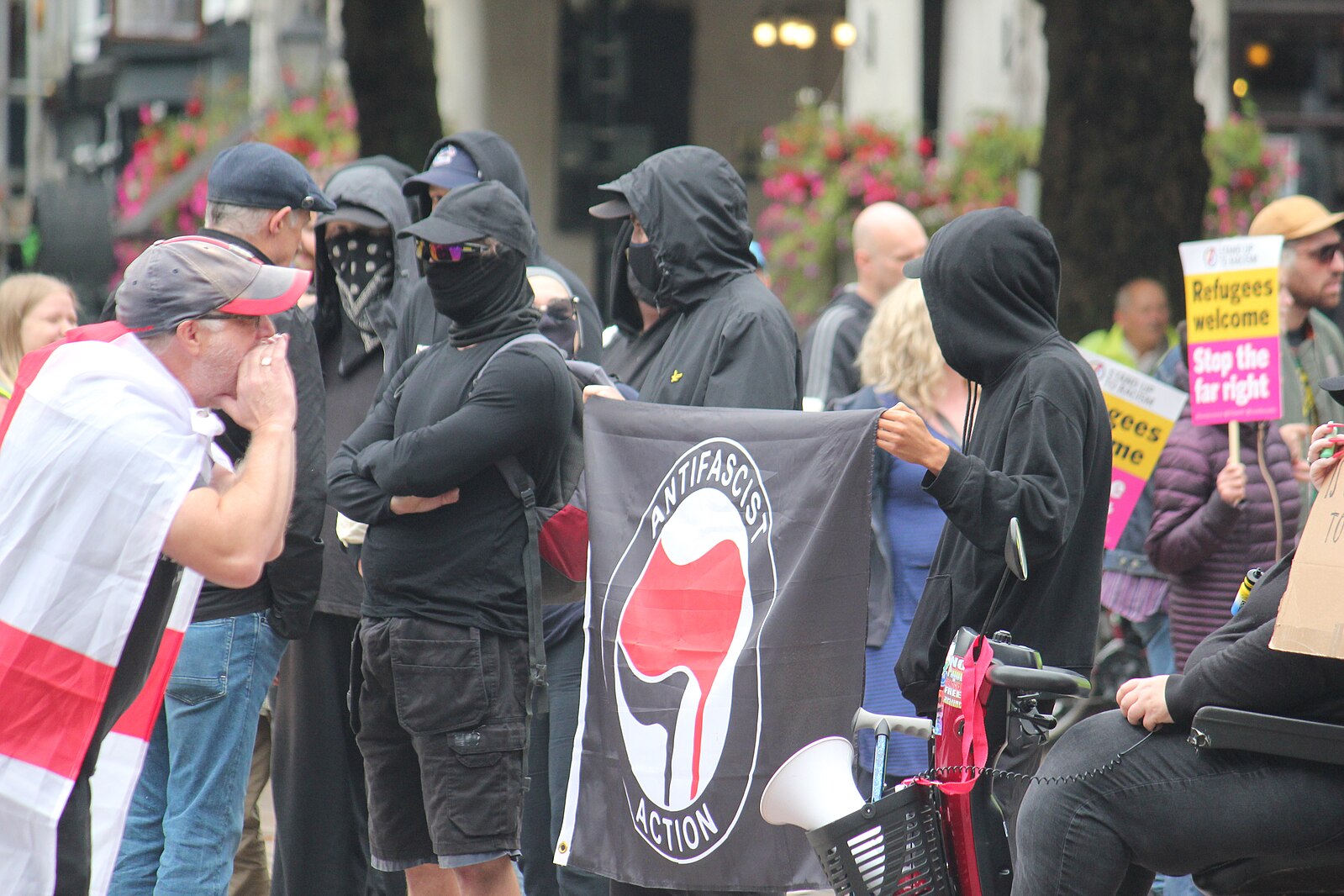
President Donald Trump signed an executive order on Sept. 22 designating Antifa a “domestic terrorist organization.” The order calls Antifa a “militarist, anarchist enterprise that explicitly calls for the overthrow of the United States Government.” Asserting a pattern of political violence, the order instructs executive agencies to “investigate, disrupt, and dismantle any and all illegal operations” of Antifa and related persons. A fact sheet from the Trump administration describes examples of political violence which it attributes to Antifa, including assaults against Immigration & Customs Enforcement (ICE) agents.
Antifa, which stands for anti-fascist, has long been a preoccupation of President Trump, who called for this designation at the end of his first term as well.
The Congressional Research Service (CRS) describes Antifa as a decentralized movement that gained prominence in 2017 after confronting white supremacists in Charlottesville, Virginia. The CRS notes that Antifa has no organizational structure, nor a common enemy list, but is composed of “loosely affiliated individuals.” Nor is there a common ideology other than anti-fascism, although some adherents are anarchists, socialists and communists. The CRS states: “Some media and law enforcement reports suggest that antifa members may be responsible for some of the violence and looting that has taken place amid the protests that have occurred recently in various US cities.” But it adds that “antifa members have been involved in peaceful protests as well.”
The legal implications of the order are unclear, as there is no statute providing for a domestic terrorist designation, as there is for “foreign terrorist organizations” under section 219 of the Immigration & Nationality Act as amended by the Antiterrorism & Effective Death Penalty Act of 1996. Domestic terrorism is defined in the US criminal code as violations of criminal law “dangerous to human life” that appear to be intended to intimidate civilians or influence government policy or officials through violence.
This executive order comes in the wake of the killing of prominent conservative activist Charlie Kirk.
From JURIST, Sept. 23. Used with permission.
See also our podcast, “Charlie Kirk = Calvo Sotelo?”
See our reports on the Charlottesville violence of August 2017.
Photo: Antifa confronting far-right rally in Portsmouth, UK. Credit: Tim Sheerman-Chase via Wikimedia Commons





HRW: Trump memo on political violence poses risk to democracy
President Trump’s Sept. 25 memorandum directing federal agencies to investigate what it describes as a nationwide conspiracy to foment political violence constitutes a serious threat to human rights and democratic institutions, Human Rights Watch (HRW) has warned.
The memorandum, “Countering Domestic Terrorism and Organized Political Violence,” instructs law enforcement and intelligence agencies to “investigate” and “disrupt” alleged networks of donors, NGOs and activists said to be funding extremist activity. It also directs the IRS to scrutinize nonprofit entities and orders Joint Terrorism Task Forces to lead the effort.
The memorandum defines the extremist activity as “self-described ‘anti-fascism'” and lists alleged examples such as the assassination of Charlie Kirk, 2024 assassination “of a senior healthcare executive,” 2022 assassination attempt of Justice Brett Kavanaugh, two assassination attempts against President Trump, as well as several political “riots.”
One reference, the 2024 assassination of a “senior healthcare executive” is widely understood to refer to UnitedHealthcare CEO Brian Thompson, who was fatally shot in December 2024. Earlier this week, President Trump connected suspect Luigi Mangione to Antifa.
Magione’s lawyers rejected the White House’s portrayal, saying in court filings that efforts to depict him as a left-wing extremist were “false, prejudicial, and part of a greater political narrative.” They argued Mangione neither condones political violence nor has ties to Antifa, which the White House statement had suggested.
During the signing of the memorandum in the Oval Office, FBI Director Kash Patel stated, “our citizens are being attacked by organized violence, and it’s being paid for by other people. So what we are going to do is follow the money…We are going to properly chase them down like the domestic terrorists that they are.”
Executive director of HRW Federico Borello criticized the memorandum, stating:
HRW criticized the directive as a sweeping and vague attempt to criminalize dissent, warning that its broad language risks chilling free expression and association. The group emphasized that targeting civil society actors without evidence undermines due process and the presumption of innocence.
HRW expressed concern that the memorandum comes amidst reports that the US Department of Justice is considering opening investigations into the Open Society Foundations (OSF), founded by philanthropist George Soros, on grounds ranging from arson to terrorism support. The OSF funds various civil and human rights organizations, including HRW. (Jurist)